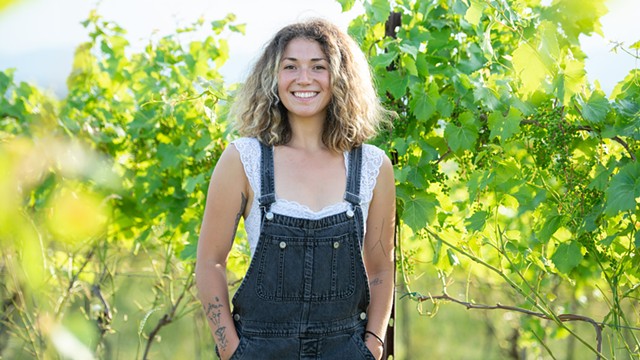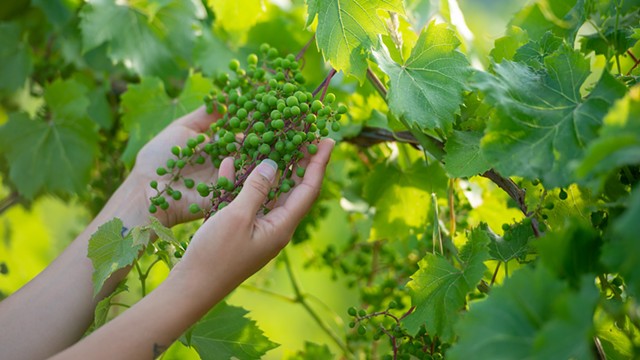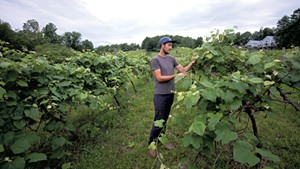
- Daria Bishop
- Camila Carrillo
When winemaker Camila Carrillo closed on her own property in New Haven this spring, one of the first things she did was bring her dog, Blue, and her mother, Sandra, out for a Mother's Day picnic. They went to the middle of the field, set up lawn chairs and a lovely spread, sat back, and took in the view.
They wanted a ritual to mark the occasion, a little time to appreciate all that this talented winemaker has accomplished in the last few years. Carrillo, 29, launched her own label, La Montañuela, in 2018 and bought a 8.78-acre piece of land this spring, the site of a future home for her and Blue. Now she has embarked on a partnership with an international distributor.
While it will take time for the fruits of her land to grow and flow in local glasses, oenophiles should keep their eyes on the new wave of Vermont winemakers that Carrillo represents. In May, she and six other notable women on the Vermont wine scene appeared on the panel "New Voices in Vermont Wine," hosted by San Francisco-based WINeFare, which supports women in natural wine throughout North America.
Carrillo could have grown up in a big family in Bogotá, Colombia. But when Sandra was pregnant with her, Camila's grandparents had other ideas. They bought Sandra a one-way ticket to Boston so her daughter could grow up with the benefit of American citizenship.
Carrillo, now 29, spent 11 years bouncing back and forth between the U.S., Colombia and Venezuela, where her grandparents lived. Finally, at 11, she made her way to Montpelier, where she attended middle and high school.
But she couldn't get La Montañuela, her grandfather's farm in the mountains outside Caracas, Venezuela, out of her mind.
"There were a couple times that I went there as a kid, about 4 years old," Carrillo said. "First of all, just the drive up there was epic. It was basically jungle. I remember that, when we were approaching the farm, there was this amazing fresh smell. There were blackberry bushes everywhere. He had a plantain grove. I would play pretend and walk though the fields and pick things and eat them."
Those visits fostered a lifelong love of nature and farming that brought Carrillo to a pivotal decision at 18. When her peers went off to college, she headed in the opposite direction.
"I went 'WWOOFing,'" she said, referring to an internship-like travel opportunity offered by the organization World Wide Opportunities on Organic Farms, which took her and a friend to an organic farm in the Tuscany region of Italy.
"They were doing my dream, living on the farm, growing and making everything there — olive oil, cheese, bread, wine," Carrillo recalled of the farmers she met. "I loved food and farming and travel and culture and wine so much by that point. I just wanted to go down the rabbit hole!"
So Carrillo spent five years learning the ropes, working in wine bars and tasting rooms. She studied winemaking through the Wine & Spirit Education Trust, earning Level II and III certification. She knew going in, she said, that her interest lay in biodynamic winemaking, which stresses a holistic view of agriculture, rather than in the conventional approach that often finds winemakers concocting blends in a lab.
Carrillo recalled being dogged by people who said that if she wanted to make wine, she would need a college education in chemistry. But she knew in her bones that continuing to travel, interning at wineries all over the world, was the best path for her.
What followed were internships in Sonoma, Calif.; Mendoza, Argentina; Yakima, Wash.; the Basket Range of South Australia; and Italy again, at a farm in the Emilia-Romagna region.
"I got creative about how I got to this place," Carrillo said. "I know that college is really great, but I don't think it should be the only option. Going the internship route really made me think, I can do this."

- Daria Bishop
- Camila Carrillo
In 2017, she returned to Vermont to work as the assistant winemaker to Deirdre Heekin, who owns vineyard La Garagista with her husband and partner, chef Caleb Barber. The two women had met briefly years before and had a few friends in common. Heekin knew Carrillo's skills and shared her preference for making wine outside a lab; La Garagista is a well-known and -loved pioneer of natural wine, not just in Vermont but in North America.
"I've been doing this for 10 years now, but it was really then that I actually began to believe in myself," Carrillo said. "When Deirdre and Caleb believed in me, when I made my first three cuvées and had my first release party for my sparkling cider — that's when I was really proud of myself, after so many years of impostor syndrome."
She's not the only one.
"I am inspired by Camila every day," Heekin said in a text message. "The way she approaches her work with me, the relationship with her own vineyard and wines, her excitement for the new land ... which she now has the opportunity to tend and plant and build upon, her passion for the world at large, and for Vermont in particular — all these things make her a woman of insight and imagination with a rare perspective and story to tell through her work with the land and with her wines."
Carrillo grows marquette, la crescent and frontenac gris grapes for her personal label, named La Montañuela for her grandfather's farm. She also collaborates with Heekin on a label series called Lost Causes and Desperate Cases, making three different styles of oxidative wines that are sold in La Garagista's online shop. La Monteñuela is stocked at natural wine shops in New York State and Domestique Wine in Washington, D.C.
"I'm super proud of them, and I cannot wait to release them," Carrillo said of her wines that are currently fermenting. "They're gonna blow people's minds."
Most of Carrillo's vintages have sold out, but her 2019 Los Enamorados Pet Nat can still be found at Domestique Wines' online store. It's a coferment of apples and grapes — something Carrillo said she never considered before working with Heekin and Barber at La Garagista. There she experimented with oxidative winemaking and creating wines across several growing seasons, exposing them to oxygen throughout the fermenting process.
Carrillo ages La Montañeula wines in big glass bottles called demijohns, which she loves because "I feel like it translates the purest form of the varietal," she said. "It's not imposing anything on the wine."
Still under 30, Carrillo is the first and only North American producer to be represented by José Pastor of Spain's José Pastor Selections. It all started when sommelier Brian McClintic visited La Garagista last fall and Heekin poured some of Carrillo's wine for him. McClintic loved it and thought his friend Pastor, an international distributor, would, too.
At harvest time, Pastor himself visited La Garagista and told Carrillo he wanted to represent her — even though she didn't have her own vineyards yet.
Now Carrillo is balancing managing a 10-year-old quarter-acre vineyard in Hinesburg, owned by non-winemaking friends, with making plans for her new property in New Haven.
"That's my Mount Everest," Carrillo said. Her eventual plans for the new property include a tiny house, plum and apple trees, and likely a whole bunch of frontenac gris vines.
For now, it's just a big field. But on that Mother's Day, Carrillo and her mom celebrated going "down the rabbit hole" and coming up in a vineyard of her own.











Comments
Comments are closed.
From 2014-2020, Seven Days allowed readers to comment on all stories posted on our website. While we've appreciated the suggestions and insights, right now Seven Days is prioritizing our core mission — producing high-quality, responsible local journalism — over moderating online debates between readers.
To criticize, correct or praise our reporting, please send us a letter to the editor or send us a tip. We’ll check it out and report the results.
Online comments may return when we have better tech tools for managing them. Thanks for reading.